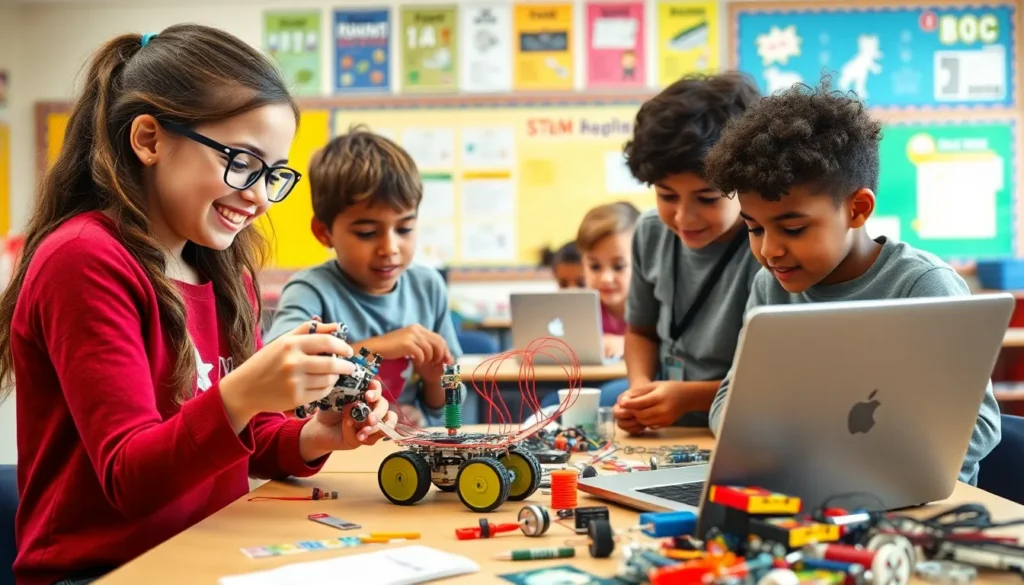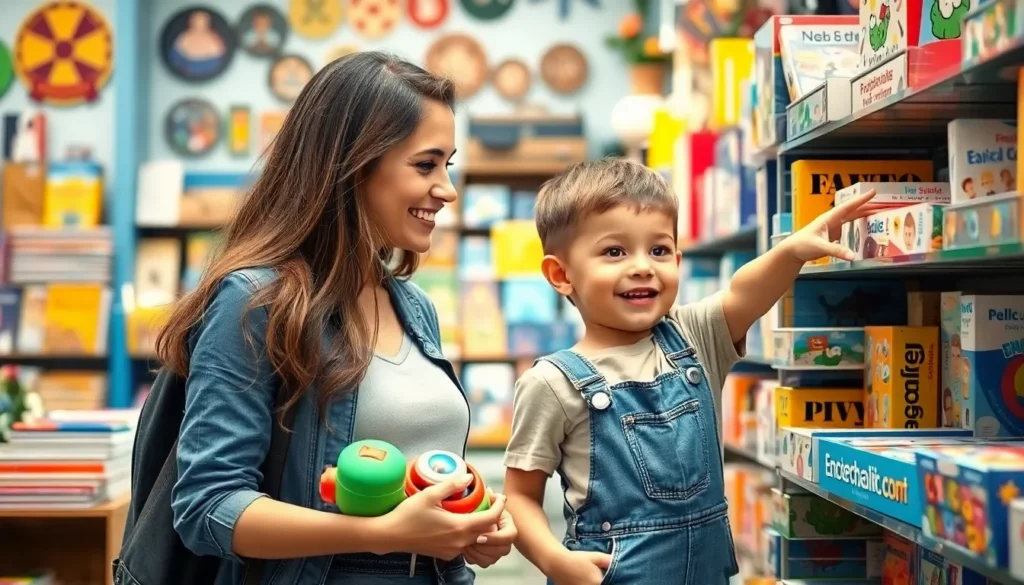Table of Contents
ToggleIn a world where knowledge is power, crafting an effective education strategy is like finding the secret sauce for success. It’s not just about textbooks and lectures; it’s about igniting curiosity and inspiring minds. Whether you’re a teacher, a parent, or a lifelong learner, understanding how to navigate the educational landscape can feel like trying to solve a Rubik’s Cube blindfolded. Fear not!
With the right approach, education can transform from a daunting task into an exciting adventure. Imagine students not just memorizing facts but actually engaging with the material. This article dives into innovative strategies that make learning not just effective but enjoyable. Get ready to unlock the potential of education and discover how a well-crafted strategy can turn even the most reluctant learners into enthusiastic scholars.
Overview of Education Strategy
Education strategy encompasses a structured approach to teaching and learning, focusing on the integration of innovative methods. Traditional techniques often fall short in engaging today’s learners. Instead of relying solely on textbooks and lectures, strategies should prioritize hands-on experiences that foster curiosity.
Incorporating technology plays a pivotal role in modern education strategy. Tools like interactive software and online resources create dynamic learning environments. Digital platforms allow for personalized learning, catering to individual student needs and interests.
Collaborative learning stands out as another critical component. Group projects and peer-to-peer interactions promote communication skills and problem-solving abilities. Engaging students in discussions encourages them to share perspectives, fostering a deeper understanding of concepts.
Implementing a holistic approach also enhances education strategy. This involves considering emotional and social factors alongside academic achievement. Addressing students’ well-being helps create a supportive atmosphere conducive to learning.
Performance metrics inform educators about the effectiveness of their strategies. Regular assessments help in identifying areas needing improvement, allowing adjustments to be made proactively. Engaging feedback loops ensure that strategies remain relevant and effective.
Finally, continuous professional development for educators strengthens the overall education strategy. Training teachers in new methodologies equips them with tools to inspire students effectively. Lifelong learning for educators reflects the principles they promote in their classrooms.
Key Components of Effective Education Strategies

Effective education strategies encompass various components critical to promoting student engagement and success.
Curriculum Development
Curriculum development plays a pivotal role in shaping educational experiences. It requires an iterative process of assessment and enhancement to ensure it meets diverse student needs. Engaging curricula integrate relevant real-world applications alongside academic content. Collaboration with educators, industry experts, and students helps create a framework that fosters critical thinking and creativity. Incorporating interdisciplinary themes nurtures connections between subjects, making learning more cohesive. Regular feedback from stakeholders is essential, guiding ongoing improvements to optimize learning outcomes.
Teaching Methods
Innovative teaching methods enhance student participation and learning retention. Active learning approaches encourage interaction, allowing students to explore concepts collaboratively. Educators can utilize technologies such as interactive simulations and multimedia resources, enriching the learning environment. Differentiated instruction addresses varying skill levels, accommodating individual learning styles. Incorporating project-based learning promotes deeper understanding through practical applications. Continuous reflection and adaptation of teaching practices lead to responsive instruction, meeting the evolving needs of learners.
Assessment Techniques
Assessment techniques are crucial for measuring student progress and informing instruction. Formative assessments provide ongoing feedback, allowing educators to adjust strategies as needed. Summative assessments offer insights into overall student performance at the end of units or courses. Utilizing diverse assessment methods—such as portfolios, presentations, and peer evaluations—provides a holistic view of student capabilities. Emphasizing mastery over memorization fosters a culture of learning that values growth. Data-driven decision-making ensures assessments align with educational objectives and support continuous improvement.
The Role of Technology in Education Strategy
Technology plays a crucial role in enhancing educational strategies by providing new avenues for learning. Incorporating digital tools transforms the educational landscape, making it more accessible and engaging.
Online Learning Platforms
Online learning platforms offer flexible options for students and educators. Many users access courses from various institutions worldwide. These platforms often provide interactive features, such as discussion forums and multimedia resources, fostering collaboration among learners. They also enable personalized learning paths, accommodating individual learning paces. For instance, platforms like Coursera and edX host an array of courses that support skill development in numerous fields. Accessibility remains a key benefit, as students can learn from anywhere with an internet connection.
Educational Apps and Tools
Educational apps and tools significantly enhance classroom experiences. Students use apps like Kahoot and Quizlet to reinforce learning through gamification. These tools often integrate with existing curricula, offering teachers resources to create interactive lessons. Many apps provide real-time feedback, helping students identify areas for improvement. Beyond traditional subjects, apps can encourage creativity and critical thinking skills. By utilizing engaging educational tools, educators can inspire a passion for learning and keep students motivated.
Challenges in Implementing Education Strategies
Implementing effective education strategies faces several challenges. Key obstacles include funding limitations and insufficient resources, which can hinder the adoption of innovative methods.
Funding and Resources
Funding disparities impact educational opportunities significantly. Schools often struggle to secure adequate financial support for new technologies or teaching materials. Limited budgets may restrict access to necessary resources, affecting curriculum development and implementation. Additionally, schools in lower-income areas might lack essential infrastructure, making it difficult to create dynamic learning environments. Finding alternative funding sources, such as grants and community partnerships, becomes crucial for maximizing potential.
Teacher Training and Professional Development
Teacher training poses another significant challenge. Not all educators receive the professional development required to implement new strategies effectively. Many existing programs don’t focus on innovative teaching methods, leaving teachers unprepared for modern classroom environments. Effective training should emphasize both pedagogy and technology integration. Continuous professional development opportunities empower educators to refine their skills and adapt to evolving educational demands. Investing in robust training programs can lead to improved student outcomes and foster a culture of lifelong learning within teaching communities.
Future Trends in Education Strategy
Innovative approaches to education strategy continue to evolve. Future trends focus on personalized learning and global educational standards.
Personalized Learning
Personalized learning emphasizes tailoring education to individual student needs and preferences. This trend involves using data analytics to assess each learner’s strengths and weaknesses. Adaptable learning platforms enable students to progress at their own pace, ensuring mastery of content. Further, educators can create customized lesson plans that foster engagement and motivation. This individualized approach enhances student outcomes, as it addresses diverse learning styles. Increased use of technology facilitates collaboration between educators and learners in developing personalized pathways. Examples of successful implementation can be found in various school districts that have adopted technology-driven strategies to maximize engagement.
Global Educational Standards
Global educational standards focus on aligning curricular objectives across different countries and cultures. By establishing benchmarks, educators can ensure students develop necessary skills for a globalized workforce. These standards promote equity in education, providing all learners with access to quality resources. Collaboration among international educational bodies supports the sharing of best practices and innovative methodologies. Stakeholders, including policymakers and educators, work collectively to adapt curricula that meet diverse needs while maintaining high expectations. The potential for improved educational outcomes grows as countries collaborate on advancing these common goals. This trend offers an opportunity to reshape future education strategies worldwide.
An effective education strategy is vital for fostering a love of learning and preparing students for the future. By embracing innovative methods and technology, educators can create engaging environments that cater to diverse learning styles.
Prioritizing collaboration and holistic development ensures that students not only excel academically but also thrive emotionally and socially. Continuous professional development for teachers remains essential in adapting to new challenges and maximizing student potential.
As education evolves, the focus on personalized learning and global standards will pave the way for a more equitable and dynamic educational landscape. Embracing these changes will ultimately empower the next generation to succeed in an interconnected world.







